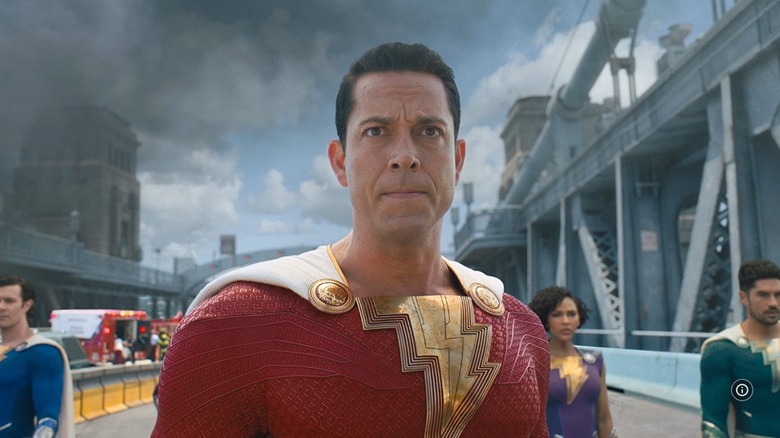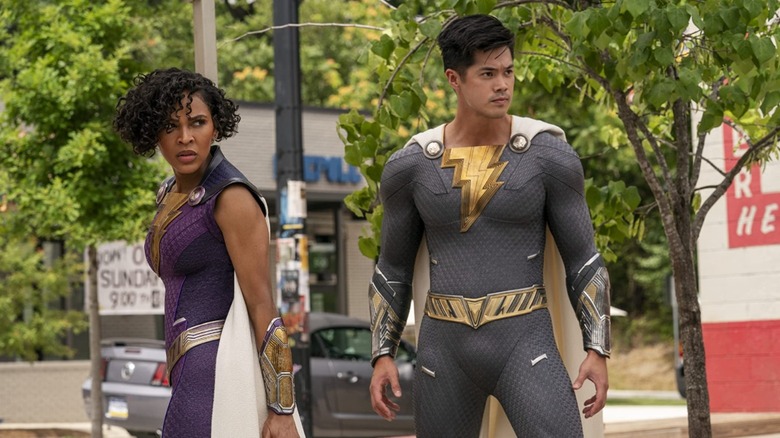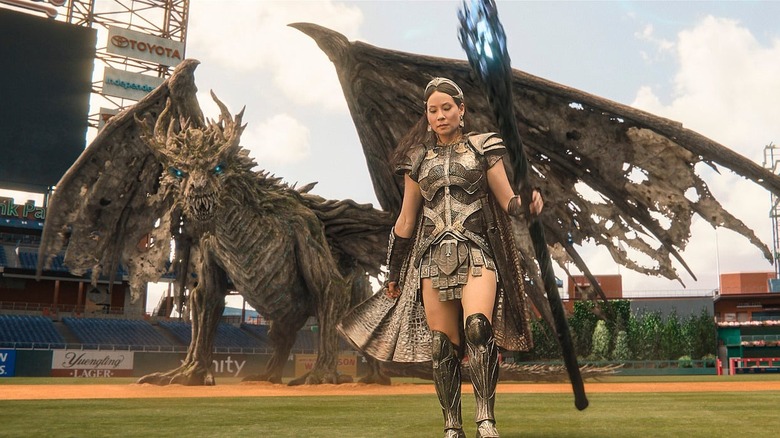Shazam! Fury Of The Gods Review: A Delightfully Campy Super-Sequel
- Effectively blends campy horror with surprisingly moving family drama
- A major upgrade from the first film -- the coming-of-age tale told here is much more resonant than the superhero origin story we got last time
- At its worst when it tries to tie into the wider DC Universe
- That cameo... no thanks
Superhero fatigue may finally be starting to kick in amongst audiences. Marvel movies, so indestructible up until recently, have started slowing down at the box office, and the DC Extended Universe was thrown into disarray after "Black Adam" was released to a muted reception — and yet the rival studios both have plans mapped out for the next decade of interlinking films and TV series, betting on no end in sight to their ongoing cultural domination. As something of a superhero skeptic, these ever-expanding onscreen universes have left me thinking of Syndrome, the villain in Pixar's "The Incredibles," whose motto "when everyone's super, no one is" has finally come true. We have more superheroes on our screens than ever, and yet this genre doesn't have the same magic it used to due to how seemingly inescapable they are.
From the outside, "Shazam! Fury of the Gods" looks like another tired caped crusader sequel, with the expected world-ending stakes; I've seen cities destroyed by CGI villains in movies so much in the past decade, I've become numb to the idea of this as a threat. And yet, somewhat unexpectedly, this was the most I've enjoyed a superhero movie in years, successfully grounding its fantastical plot in the palpable coming-of-age anxieties rarely explored in blockbusters of this scale. For all its campy thrills — and believe me, there are many — this second "Shazam!" outing might be the most tethered to a believable reality since Sam Raimi's magnificent "Spider-Man" trilogy, another superhero film series that understood its hero's problems outside of the suit are what made him such a fascinating character to millions.
Larger than life but more down to earth than other superhero adventures
Picking up four years after the last film, in "Shazam! Fury of the Gods," Billy Batson's foster family is now firmly established as a superhero team in Philadelphia. The only thing that separates them from the Justice League, however, is the fact that they are near-universally reviled by the city for the destruction that they leave in their wake, with every heroic mission reported on by the media as another embarrassment for the "Philadelphia Fiascos," no matter how many lives they save. If the first film borrowed too liberally from the classic Tom Hanks comedy "Big," merely adding superpowers to its well-worn narrative formula, then the sequel immediately sets this aside to focus on the destabilizing effects of working out how to be a superhero before you've even experienced adulthood.
The story takes place in the weeks leading up to Billy's 18th birthday, and there's additional anxiety about aging out of the foster care system, in tandem with his own superhero imposter syndrome. If there is a flaw with the film, then it's that Zachary Levi's heightened, goofier take on the character's hero persona is never quite in step with Asher Angel's considerably more down-to-earth real-life counterpart. They feel like two different people, and only one of those feels like an authentic representation of a teenager thrust into a position of superpowered responsibility, whilst the other plays it like a Will Ferrell-style comedic archetype of an overgrown manchild. It lessens the sincerity with which returning director David F. Sandberg clearly intends to treat his teen characters, with the filmmaker using Raimi's "Spider-Man" movies as a clear blueprint; just because they get into silly adventures, doesn't mean he doesn't take their trials and tribulations seriously.
Much more satisfactory is the arc given to Billy's foster brother Freddy, played by Jack Dylan Grazer. A superhero obsessive who was relentlessly bullied in the first film due to his physical disability, there was some controversy that the climax of that prior movie saw him transform into an able-bodied hero following his transformation. While not directly ableist, it did leave a sour taste in the mouth, and the character's journey this time seems to be a direct response to those criticisms. After the three Daughters of Atlas (Helen Mirren and Lucy Liu, both delivering the over-the-top performances this movie requires, alongside Rachel Zegler, who gives off effortless movie star charm in the comparatively down-to-earth role) take away his powers, Freddy effectively must learn how to be a hero without leaving his own body. More so than the other movies in the DC stable, the "Shazam!" franchise is squarely aimed at children, and that's why this simplistic moral works — for older audiences, the fact that a typical superhero movie, with the usual world-destroying threats by otherworldly beings, is grounded within the daily anxieties of its human characters is commendable. The tone may be lighter than much of the DCEU, and yet it feels far more connected to reality than any of it.
At its best when it does its own thing
This light tone is another reason why the few ties this has to the wider DC Universe don't feel like cynical excuses to broaden a cinematic universe. The likes of Wonder Woman, Superman, and Aquaman are often invoked in this world as reliable counterparts to the more shambolic Shazam! family, but mercifully seem to exist entirely outside of the lives of these characters. When one of them does make a cameo late in the film — something I wasn't going to mention, until the latest trailer chose to make it fair game to spoil it — it arrives with a thud, feeling like a last-minute reshoot designed to tie this franchise in with the wider DCEU that James Gunn is redeveloping. And that's before you even acknowledge what a half-brained deus ex machina this character serves as, appearing simply to help the film back out of a narrative corner it's written itself into.
It's not the most satisfying note to end on, considering how the rest of the film is refreshingly uncynical, not existing purely to expand a universe — in fact, the action is largely restricted to the Philadelphia city limits. Sandberg, who directed "Lights Out" and "Annabelle: Creation" before pivoting to this blockbuster franchise, is clearly having a great time channeling Sam Raimi in the director's chair, similarly pushing the limits of how many creepy creatures and deadly villains he can throw into the mix of a film primarily aimed at very young audiences. For the most part, the campy horror and the earnest family drama sit together far better than I would have assumed, especially considering I wasn't a big fan of its predecessor; but then again, the human stakes raised in this film are far more interesting to explore on this scale than the straightforward origin story we got last time.
In a genre that's increasingly missing that human element, focusing entirely on the heroes and villains with no thought for the people and places they claim to protect, "Shazam! Fury of the Gods" is an unexpected breath of fresh air. No, it's nowhere near the best of the genre, but by keeping its stakes firmly rooted within the hopes and fears of a nuclear family unit, it has a heart that many recent superhero blockbusters have been sorely lacking.
"Shazam! Fury of the Gods" hits theaters on Friday, March 17.


